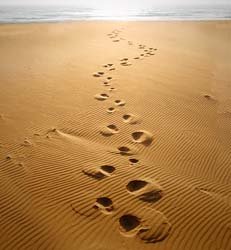|
The Jews, while traveling through the desert, knew that their ultimate destination was the Land of Canaan, which they would settle, farm and remake into a holy land, the Land of Israel. Before entering the land, they wanted a report: What type of land is it? What are its inhabitants like? How hard will it be to conquer? Therefore, they asked Moses to send spies.
Before the spies left, says the Talmud, Moses prayed for one of the spies, his disciple Joshua: “May G-d protect you from the schemes of the spies.”
If Moses had reason to suspect that the spies had nefarious intentions, why did he send them to begin with? And why did he pray for only one of them, Joshua?
* * *
There were three tzadikim who lived in a generation of wrongdoers: Noah, Abraham and Moses. Each one responded differently to the wrongdoings of their generation.
Noah was warned by G-d that there would be a flood; however, he saved only himself and his immediate family. While he was building his ark, people inquired about what he was doing, and only then did he explain that G-d would bring a flood. However, he did not rebuke the people of his own initiative.
Abraham did not wait for people to approach him. Rather, he went forth and taught all the people to believe in the One G-d. However, when G-d told him that He was about to destroy the city of Sodom, Abraham beseeched G-d to save the town on behalf of the tzadikim who might be living there. When it turned out that there were no tzadikim in Sodom, Abraham ceased his prayers.
Moses, the “loyal shepherd” of the Jewish people, reacted unlike both of them. When the Jews sinned with the Golden Calf, Moses pleaded with G-d to forgive the Jews, all of them. In fact, Moses told G-d, “and if not, erase me from the book You have written.”
* * *
When the spies went out to tour the land, Moses suspected that they might not return with a positive report. They had their reasons for not entering the land; they believed that an agrarian lifestyle, working and farming the land, would hamper their spiritual development. They preferred the stark life in the desert, where G-d provided their needs and all they had to do was study Torah.
Moses knew that Joshua would be his successor. A leader must take into account the needs of all the people of the generation. For a select few, perhaps the path of the spies was appropriate. Not everyone is cut out to toil and work the land. For some, an ascetic life of study is the correct course. But not for all. The spies wanted to impose their personal lifestyle choice on all the people. A true leader cannot do that; a true leader must realize that the best course for the majority of the people of the generation is to work the land, and transform the very earthiness of the world into a dwelling for G-d.
For this reason, Moses prayed for Joshua, that he should not get caught up in the schemes of the spies. Joshua, as the future leader, must be trained in the path of leadership, to consider the needs of the entire generation.
The same will be the attitude of King Moshiach. Although Moshiach could potentially bring the Redemption through his own powers, he will insist on enlisting the cooperation of every one of us, so we can all share in the satisfaction and reward.
(Based on an address of the Lubavitcher Rebbe, Likutei Sichos vol. 2, p. 320)
|

